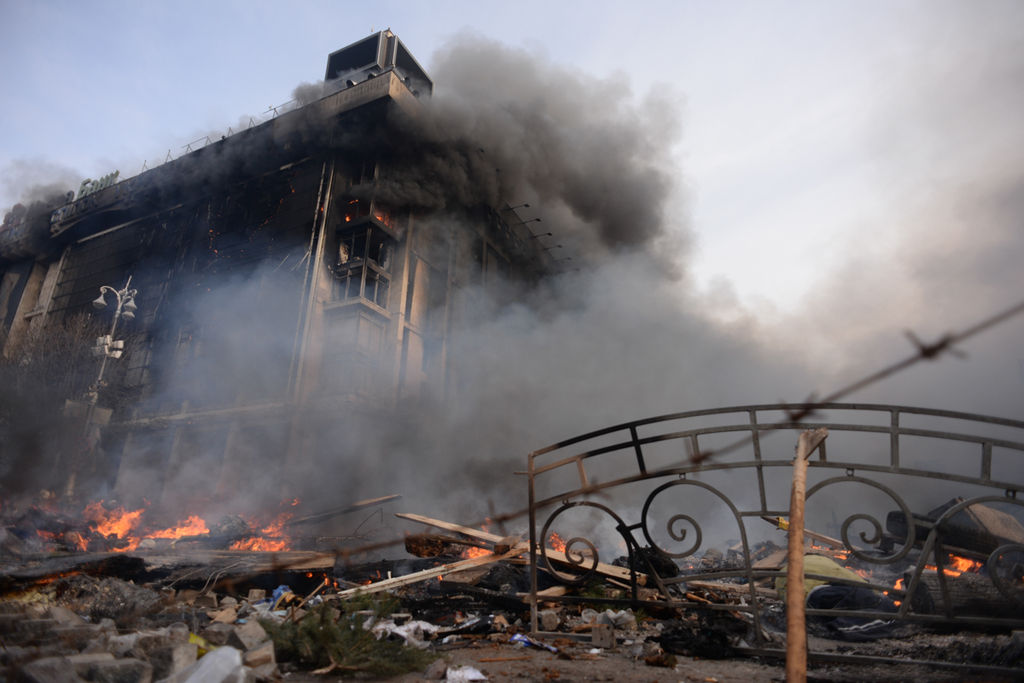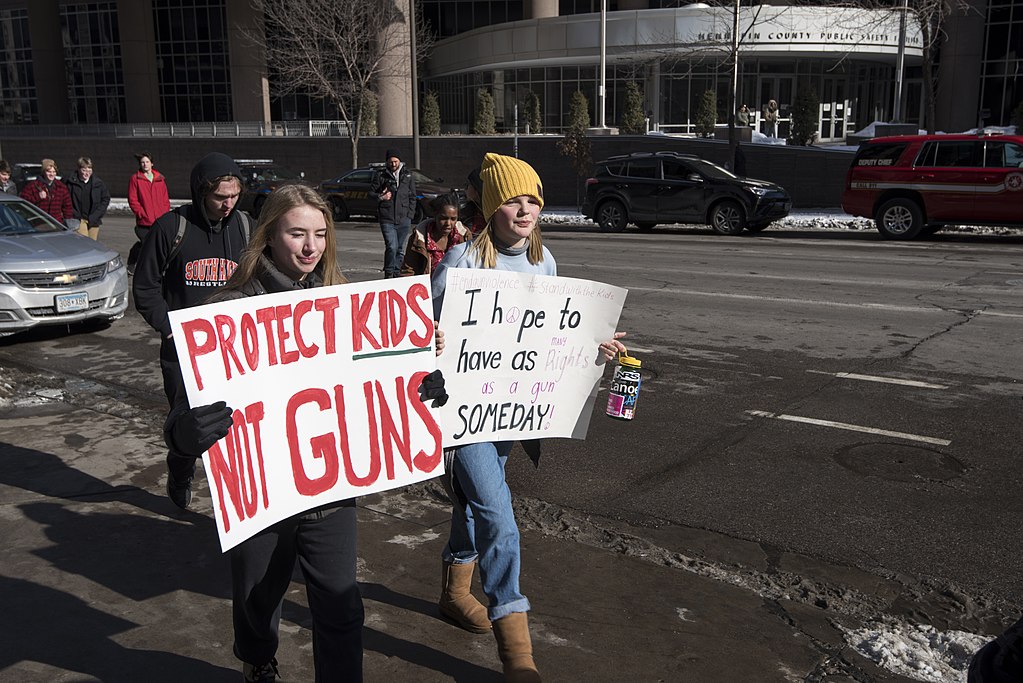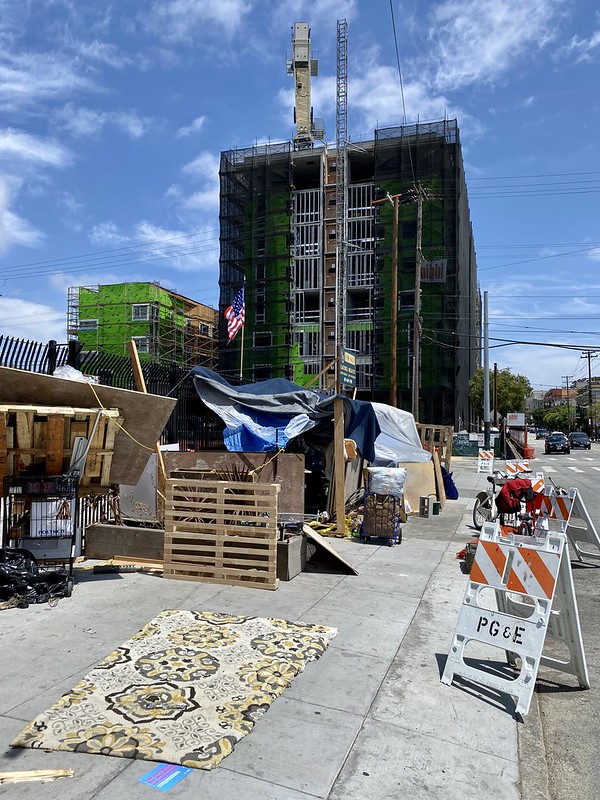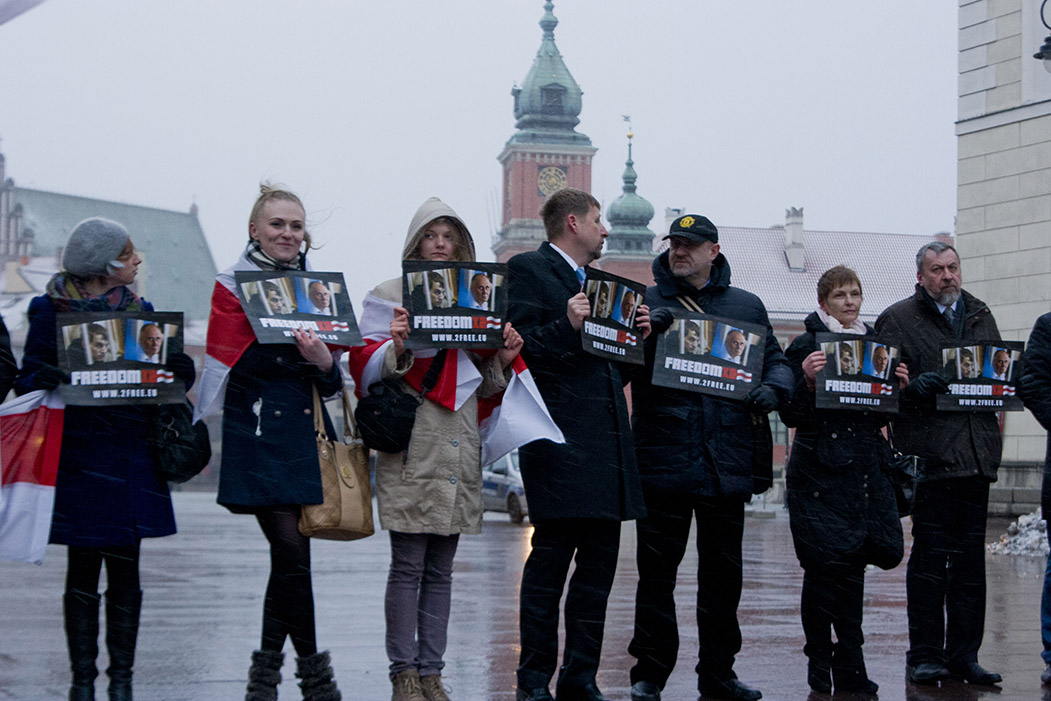At a moment that is Hamletesque in Minsk and Washington alike, Marci Shore illuminates moments of choice, and what these mean for freedom and human dignity. The following is a transatlantic conversation inspired by Ukraine, moderated by Kant and open to all.
In the years between the fall of the Berlin Wall in 1989 and the attack on the Twin Towers on 11 September 2001, my uncle worked as a trader on Wall Street. I never took a particular interest in his work. Once, though, when I was a graduate student, he suggested that I visit the floor of the New York Stock Exchange – if only as an anthropological field trip. My uncle worked with a broker who worked on the floor itself, and he tasked his colleague with being my guide.
So one day I entered the New York Stock Exchange. It felt, somewhat unexpectedly, like descending into Dante’s inferno: dark and claustrophobic, with too many screens and too little natural light. But the surrealism lay less in the Dantean aesthetics than in the ungraspable volume of buying and selling; the dizzying fluttering of prices; the inconceivably large amounts of money flitting about the world in seconds. Yet nothing tangible was changing hands. The objects being bought and sold had transcended the realm of the physical. It was Hegelian dialectics, the sublation – Hegel’s Aufhebung – of materialism: the material consummated itself in the imaginary. There was no more thing, no more product, no material object there anymore. Materialism taken to its highest power negated itself; it became immaterial.

Trade union building facing Maidan square is burning into flames. Clashes in Ukraine, Kyiv.
Photo by Mstyslav Chernov/Unframe/ CC BY-SA from Wikimedia Commons
Back to Kant!
When I’ve spoken to other Americans about the Maidan, the Ukrainian revolution of 2013-2014, they have often asked about the name ‘Revolution of Dignity’. Why ‘of dignity’?
I began to answer by going back to Immanuel Kant. This idea is not original; it belongs to a long Central European tradition. Whenever the world begins to feel too ominous, someone calls out, ‘Zurück zu Kant!’ ‘Back to Kant!’ (In a 1981 essay titled ‘Why Do We Need Kant?’, the Polish philosopher Leszek Kołakowski explains quite beautifully why this anxiety-motivated ‘Back to Kant!’ impulse is entirely justified.[1]) Dignity, as Kant invokes it, reveals its meaning in contrast to ‘price’. In Foundations of the Metaphysics of Morals, the eighteenth-century philosopher from Königsberg writes: ‘Whatever has a price can be replaced by something else as its equivalent; on the other hand, whatever is above all price, and therefore admits of no equivalent, has a dignity.’[2]
This is the foundation of Kant’s moral philosophy: A person does not have a price. A person is not replaceable or exchangeable. A person has dignity. From this follows Kant’s categorical imperative: always treat a person as an end, never as a means.
Assigning a price
In turning to Kant to explain Ukraine’s Revolution of Dignity, I do not mean to suggest that violations of his categorical imperative take place only in post-communist countries like Ukraine, or Poland. Or Hungary. Or Serbia. Or Belarus. In the United States, our current president declared a ‘zero-tolerance’ immigration policy. Many Americans are struggling. Their quality of life is worse than that of their parents a generation ago. They are unemployed or working below-poverty-wage jobs; they have been evicted from their homes; they have no health insurance; they are unable to pay for education or adequate food for their children. They are resentful, and they have good reason to be resentful. Political leaders deflect attention from inadequate social welfare, financial corruption, obscene corporatization of healthcare – in short, from kleptocratic oligarchy – and blame the suffering of their constituents on Others – gays, immigrants, Muslims, people with darker skin. Scapegoating is neither especially modern nor especially postmodern. It has always been with us.
Unable to get the money from Mexico to build a border wall as he had absurdly promised, the president demanded US$25 billion from Congress. In the meantime, Central Americans fleeing violence have continued to make desperate trips hundreds of kilometers through Mexico, in impossible conditions, often with small children, in order to reach the American border and plead for asylum. Many have already seen parents or siblings killed.
In spring 2018, the American presidential administration initiated a new policy: when refugees crossed the border, Immigration and Customs Enforcement (ICE) guards would take away their children. The border guards began to wrench terrified toddlers from their mother’s arms, throw them in cages, and pack them off to detention centers, often hundreds of miles away. The children have been left hungry, dirty, dehydrated. Sometimes the detention centers are freezing. Sometimes they are scorching hot. The government has quickly lost track of which children belong to which parents. Sometimes the children are too young to talk.
The attorney general declared this family separation policy to be a ‘tough deterrent’ to asylum seekers. The president explained a different motive: he is using the children to blackmail the Democrats in Congress. Give me the $25 billion to build the wall and perhaps I will return those children to their parents. In the meantime, these children are hostages.
This is the brazen ‘laying bare’ (captured in the useful Slavic expression obnazhenie) of the fact that these children are being used as chips in a high-stakes political game. They have been assigned a price.
ICE guards operate according to the principle of proizvol – a Russian word that blends capriciousness with tyranny. That is, they may do anything they like. (It was only a matter of time before they would come for Americans as well. The precedent of being outside of any law had already been set.) On the Maidan, Ukrainians challenged proizvol with dignity. Early in the Second World War, the French philosopher Simone Weil defined force as ‘that x that turns anybody who is subjected to it into a thing. Exercised to the limit, it turns man into a thing in the most literal sense: it makes a corpse out of him.’[3] Proizvol carries some of this sense of force as well.
‘The Revolution of Dignity’ invokes ‘dignity’ in the Kantian sense: dignity in contrast to ‘price’ – and in contrast to prodazhnost’, a Russian word for corruption that refers less to an act than to an existential state.[4] Its literal translation would be ‘saleability’, or ‘venality’ without the high register. In Kyiv in December 2014, I met two young men who had joined a self-defense unit during the Maidan. Later they went to war and fought against the Russian-sponsored separatists in the battle for the Donetsk airport. When I asked them about the reasons for their choices, they struggled to put their thoughts into words. They kept returning to the idea of prodazhnost’, of buying and selling. They wanted to be with people who ‘could not be bought’. ‘You can’t buy us’, they more than once imparted.[5]
‘Dignity’ means subjectivity, personhood, a self that cannot be bought and sold. Dignity is a revolt against prodazhnost’ and against proizvol, the essence of which is being treated as an object, not a subject – that is, being treated as a thing and not a human being.
The limits of non-contradiction
For Kant, the value of human dignity must be absolute and a priori – that is, prior to experience and not subject to contingency. Freedom, however, cannot be absolutized as a value without encountering contradictions. Freedom does have a price. For the early modern philosopher Thomas Hobbes, freedom and security exist in a zero-sum relation: one is only acquired at the expense of the other. Either we choose freedom, or we choose security. The twentieth-century philosophers Isaiah Berlin and Leszek Kołakowski approach this question less as a radical Either/Or, yet still with a sober sense that some good things are naturally in tension with other good things: there is no such thing as maximizing freedom and security, or justice and mercy, or honesty and kindness, at once. As Kołakowski explains, the law of non-contradiction applies only to truth, not to values: values can and often do contradict one another. Freedom for everyone, Kołakowski points out, threatens self-negation. It can quickly become the oppression of the weak by the strong.[6]
Freedom of speech is a value. It is essential to liberal democracy, arguably a precondition for allowing truth to emerge. Yet it, too, has a dark side. During the September 2015 debate among candidates for the Republican presidential nomination, the man who eventually became president spoke out against childhood vaccinations, claiming that they cause autism. ‘Just the other day’, he said, ‘two years old, a beautiful child, went to have the vaccine and came back and a week later got a tremendous fever, got very, very sick. Now is autistic.’[7]
There is no credible scientific evidence that vaccinations cause autism. Physicians spoke out against the claims, which were false. Even so, a statement made by a candidate for the American presidency in a nationally televised debate carries authority. It was inevitable that many parents would listen to him; that they would not vaccinate their children; that some would get sick and infect others; that some of those children would not survive.
The man who became president was not held accountable then. Five years later, in the midst of a global pandemic, he suggested during a press conference that Americans should ingest disinfectant to dispel coronavirus. ‘I see the disinfectant that knocks it out in a minute, one minute’, the president said. ‘And is there a way we can do something like that by injection inside, or almost a cleaning?’
‘It’s a common method that people utilize when they want to kill themselves’, said Dr. Vin Gupta, a global health expert who commented for NBC and MSNBC news. Reckitt Benckiser, the company manufacturing Lysol cleaning products, rushed to issue a warning. ‘We must be clear that under no circumstance should our disinfectant products be administered into the human body (through injection, ingestion or any other route)’, said a spokesperson. It was time to bring back the putrid-green Mr. Yuck stickers of the 1970s, warning of what should never be swallowed – this time for adults.
Mainstream media outlets have now questioned openly whether they should provide live coverage of presidential press conferences – the president’s right to free speech has endangered public safety.
The dialectics of the market
A free market is also a value. Attempts to abolish the market and institute state-controlled communism resulted in political systems much more dystopian than utopian. Free enterprise incentivizes individual initiative, hard work and creativity. The market has been behind centuries of technological innovations, bringing us everything from waterproof shoes and solar panels to microwave ovens, child car seats, cell phones and hybrid cars.
Economic freedom contains its own dialectic, however. In the United States, absolutizing the value of the free market has opened the space for the privatization of prisons. The American government contractually obliges itself to deliver a certain number of prisoners. As a for-profit venture, a private prison is incentivized to increase the number of inmates. In other words, the creation of criminals has become profitable; in inner-city, largely African-American neighborhoods in particular, a police culture of ‘provocation’ has come to be taken for granted. We currently have the highest incarceration rate of any country in the world, and one that grossly disproportionately targets Americans with darker skin.
Prisons are not an isolated instance of capitalist perversity. When the coronavirus arrived in the United States, hospitals in a privatized healthcare system were forced to compete against one another to buy masks. Black market middlemen responded with wild price gouging. Doctors and nurses became infected with the coronavirus and died because the government declined to coordinate the distribution of protective equipment. Connecticut Senator Chris Murphy described our medical supply system as ‘Lord of the Flies’.[8]

High school student protest march against gun violence and for gun law reform in Minnesota
Photo by Fibonacci Blue from Minnesota, USA / CC BY from Wikimedia Commons
Chekhov’s gun
Another value is the right to defend oneself. In the United States, this has come to be interpreted as the freedom to walk into a Walmart and purchase toothpaste, a soccer ball and a semi-automatic weapon – ‘one-stop shopping’. Americans own an estimated 265 million guns, an average of more than one gun per adult. Hospital emergency rooms are clogged with shooting victims, schoolchildren practice ‘active shooter drills’, and teenagers attend the funerals of their classmates. An average of 100,000 Americans a year are shot and wounded, and some 36,000 more killed by guns – approximately one hundred every day. A Yale University study of New Haven’s low-income neighborhoods found that 28.6% of residents had family members or close friends who had been wounded by gun violence, and 18.1% had family members or close friends who had been killed.[9] A 2014 Yale study of the highest-crime neighborhoods in New Haven surveyed approximately 300 residents, of whom nearly 60% reported that a close friend or family member had been killed.[10]
I am free to walk into a store and purchase a semiautomatic firearm alongside a cappuccino maker, beach towels, and children’s vitamins in the form of gummy bears. But the price of that freedom is that I do not feel free to walk the half-mile from my house to the nearest grocery store after dark. And our babysitter’s teenage cousin was shot to death on the street during the coronavirus lockdown – two years after his older brother had nearly lost use of both his legs from gunshot wounds, and several years after our babysitter’s eight-year-old brother was hospitalized for over a month after being hit by a stray bullet from a street-fight that went through the window of their home. Collateral damage. I worry about my children every single day when I take them to school: in Sandy-Hook, some thirty minutes by car from where I live, twenty-six people were shot to death in an elementary school, including twenty-six and seven-year olds in the first grade. A brilliant undergraduate of mine, now a physician, was working as an emergency medical technician at the time. That day he was among the first responders to arrive in Sandy Hook. But there was nothing for him to do. Everyone was dead.
Because Chekhov was right about guns: once a gun appears on the stage, it follows that it be fired before the end of the last act. ‘Chekhov’s gun’, as it turns out, applies to real life as well as to the theatre.
Our political leaders too rarely read Chekhov.
They also too rarely read Freud. The president enticed voters by granting them permission to express rage and resentment – by making everything permissible. Now, if a man saw a woman on the street and wanted to rape her, he could declare that aloud.
Freud tells us that the demands of civilization require us to repress our natural instincts – the universal drives Freud calls Eros and Thanatos, lust and aggression. Freedom from this repression is authentic freedom – for which, Freud explains, we pay the small price of the destruction of civilization.[11]
The moment of choice
And so back to Kant.
Back to a radical freedom that can still, perhaps, ground us. Freedom for Kant is above all freedom of will, which is the necessary precondition for morality. It must therefore be posited, despite the fact that it can never be proven. Kant tells us this openly. To embrace our subjectivity – our identity as rational beings possessed of dignity – is to assume our freedom of will. Free will creates the space for moral choice.
In the days of the Solidarity movement in Poland, Adam Michnik insisted on ‘subjectivity’.[12] He grounded Kantian free will in the particular conditions of communist Poland: he called on his fellow Poles to live as if they were free persons in a free country – that is, to live and behave as if each person were an autonomous subject with free will taking responsibility for all actions, regardless of any social or political constraints.[13] ‘All of us take responsibility’, declared Solidarity leader Lech Wałęsa, speaking at the gates of the Gdańsk shipyard in August 1980.[14]
That was forty years ago.
In 2014, I spoke with a historian friend in Poland about the Maidan. ‘Subjectivity’, he said to me, “– I haven’t heard that word since the days of Solidarity.”
For Kant the most meaningful freedom is our freedom of will: this endows us with the dignity of full moral subjects. This kind of freedom, Hannah Arendt tells us, is uniquely human; it ‘was created when man was created but not before.’[15] Once we act, our actions enter into the sphere of causality; we lose control over the consequences of our actions, for these consequences are potentially infinite. ‘The reason why we are never able to foretell with certainty the outcome and end of any action’, writes Arendt, ‘is simply that action has no end. The process of a single deed can quite literally endure throughout time until mankind itself has come to an end.’ This is so, Arendt says, because of the ‘boundlessness of human interrelatedness’.[16]
But what makes us moral subjects is not the consequences of our actions but rather our ability to choose to act from a sense of moral duty. In every case, action – the choice to act – implies a beginning; it has a quality of natality. For Arendt, ‘the miracle that saves the world. . .from its normal, “natural” ruin’ is precisely natality – that is, the human capacity to begin.[17] The Maidan reminded us that revolution is a revelation of this capacity, the capacity to make a choice and set in motion something new.
Action is thus a moment of discontinuity, a break between past and future. This break – what we call the present – has long presented itself as a philosophical problem: in its ungraspable punctuality, the present has no duration, there is no way to take hold of it. For the French philosopher Jean-Paul Sartre, the present is not a length of time but a border. It is the border between the realm of facticity – what simply is, what has already happened and cannot be changed – and the realm of transcendence, an opening to go beyond one’s hitherto existing self, to go beyond what has been.[18] For Sartre, ‘bad faith’, mauvaise foi, is the failure to recognize this border between facticity and transcendence. To live in bad faith is to project facticity into the future and so deny the possibility of – and thus the responsibility for – going beyond what is.[19]
In everyday life, most often we do not notice the border between facticity and transcendence. Revolution illuminates this border; it casts a bright light on the present; it insists that we grasp the present as an Augenblick, a moment of choice, that we take hold of ourselves as full human subjects with dignity. This is the moment of our greatest freedom and our greatest responsibility. Perhaps the lesson of the Revolution of Dignity is the reminder of this freedom: that we can take hold of the present, overcome what has been, go beyond who we have been until now. We can – even if that light illuminating the border shines only in rare moments, flickers and then appears to be gone.
Just perhaps in Belarus – and just perhaps in America – this moment has now come.
Author’s note: In August 2018, I was asked to write a lecture for the 25th annual Lviv Book Forum on the topic of ‘the price of freedom’. The lecture was addressed to a Ukrainian audience, and published in Ukrainian and Russian. Rereading that text in Vienna in August 2020, while watching Portland and Minsk and Grodno and Kenosha, Wisconsin, I felt as if, almost uncannily so, it should be (re-)addressed.
[1] L. Kolakowski, ‘Why Do We Need Kant?’, trans. Wolfgang Freis, Modernity on Endless Trial, Chicago, University of Chicago Press, 1990, pp. 44-54.
[2] I. Kant, Foundations of the Metaphysics of Morals, trans. Lewis White Beck, New York, Macmillan, 1987, p. 53.
[3] See: S. Weil’s 1939 essay ‘The Iliad, or the Poem of Force’, James P. Holoka, ed. and trans., Simone Weil’s The Iliad or Poem of Force: A Critical Edition, Bern, Peter Lang, 2006.
[4] Prodazhnist’ in Ukrainian.
[5] I tell this story in more detail in The Ukrainian Night: An Intimate History of Revolution, New Haven and London, Yale University Press, 2018, pp. 238-243.
[6] See: L. Kolakowski, ‘In Praise of Inconsistency’, trans. I. A. Langnas and A. Rosenhaft, Dissent 11:2 (April 1964), pp. 201-209.
[7]See: A. Eunjung Cha, ‘The Origins of Donald Trump’s autism/vaccine theory and how it was completely debunked eons ago’, Washington Post (17 September 2015).
[8] C. Murphy, ‘Federalize the Medical Supply Chain, Before It’s Too Late’, Barron’s (31 March 2020): https://www.barrons.com/articles/federalize-the-medical-supply-chain-before-its-too-late-51585665386
[9] A. Santylli, et al, ‘Bridging the Response to Mass Shootings and Urban Violence: Exposure to Violence in New Haven, Connecticut’, American Journal of Public Health (March 2017); https://ajph.aphapublications.org/doi/full/10.2105/AJPH.2016.303613
[10] ‘Yale: Strong Neighborhood Ties Reduce Gun Violence’, New Haven Register (20 December 2014).
[11] See: S. Freud, Civilization and Its Discontents, trans. James Strachey, New York, W. W. Norton and Company, 1989.
[12] See: A. Michnik, Takie czasy. . .rzecz o kompromisie, London, Aneks, 1985, p. 12.
[13] See among other texts: A. Michnik, ‘A New Evolutionism’, Letters from Prison and Other Essays, trans. M. Latynski, Berkeley, University of California Press, 1985, pp. 135-148.
[14] A clip of this speech with English subtitles appears in the 1986 film Citizens by Richard Ware Adams: http://encountersthroughfilm.com/films/citizens/
[15] H. Arendt, The Human Condition, Chicago, University of Chicago Press, 1998, p. 177.
[16] Arendt, The Human Condition, p. 233, p. 190.
[17] Arendt, The Human Condition, p. 247.
[18] See: J-P. Sartre, ‘Phenomenology of the Three Temporal Dimensions’, Being and Nothingness, trans. H. E. Barnes, New York, Washing Square Press, 1956, pp. 107-129.
[19] J-P. Sartre, ‘Bad Faith’, Being and Nothingness, trans. H. E. Barnes, New York, Washing Square Press, 1956, pp. 86-116.
Published 29 September 2020
Original in English
First published by Eurozine
© Marci Shore / Eurozine
PDF/PRINTIn collaboration with
In focal points
Newsletter
Subscribe to know what’s worth thinking about.
Related Articles

Russian art museums and galleries, navigating Putin’s censorship, either conform or risk closure. Dissenting cultural workers are sacked, artists arrested. Pro-war propaganda is both sardonically replacing exhibitions once celebrating Soviet Ukraine in Russia and eradicating Ukrainian culture in the occupied territories.

House keys recur in the stories of Crimean Tatars and Palestinians displaced from their respective homelands in the 1940s, and Ukrainian citizens fleeing Russian invasion since 2014. Ethnographic research and discourses on art and justice show how objects emblematic of home salvage the history of exiled peoples from oblivion.








